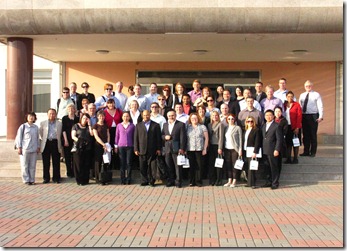Andrew Weil has been making the media rounds with his new best seller, Spontaneous Happiness. His exploration of depression as a rising global phenomenon caught my attention.
Weil, an M.D. with an interest in wellness, points to the growing body of research on links between rising global wealth – and the adoption of the modern Western lifestyle (sedentary, solitary, stimulus-overloaded, indoors, technology-filled) and diet (processed and engineered) that goes with it – and higher global rates of depression.
I look at Leslie Chang’s award-winning Factory Girls: From Village to City in a Changing China and see a case study of what he means (and one way to understand China’s distinction in having the highest female suicide rate in the world).
Closer to home, 1 in 10 people in the U.S. today are on depression medication. This includes millions of children. The World Health Organization projects by 2030, more people world-wide will be treated for depression than any other health condition.
Plain and simple, countries with the least developed lifestyles have the lowest rates of depression. “There seems to be something about modern life that creates fertile soil for depression,” says Martin Seligman, father of the field of positive psychology (and author of Flourish, discussed in an earlier post).[1]
Concludes Weil: our “ancient brains” just aren’t equipped for 21st century life (and we’d better start doing something to keep them and the bodies that fuel them in good working order). Amen.
So are you going to do anything different in your life for knowing this? I ask because Weil’s message isn’t really new.
Fourteen years ago, Harvard psychologist Robert Kegan warned us[2] that modern living is just too darn hard – that over an increasing portion of our lives, there’s a mismatch between the complexity of what we need to know and understand to function productively and the human capacity to grasp it all. The result: increasing stress and a struggle to develop more sophisticated ways of thinking and learning to respond. The flattening of the world has only magnified that.
Seven years later, psychiatrist Edward M. Hallowell offered a different slant in Harvard Business Review in “Overloaded Circuits: Why Smart People Underperform” – an article that remains one of the most read HBR reprints today. Hallowell spoke of an increasing number of patients reporting symptoms similar to those of attention deficit disorder without having that disorder. Their symptoms were merely the brain’s natural response to stress, stimulus, and overload: impatience, as well as diminished capacities for problem-solving, resilience, focus, memory, and creativity. Talented executives became “frenzied underachievers.”
We can all do better than that – and have to, given today’s fast-paced world. Suggestions for how from my most recent book, Reframing Academic Leadership.[3]
Learning to Cope in a World on Over-drive
Healthy leaders care for themselves and build vitality by attending to five key areas: boundaries, biology, balance, beauty, and bounce.
Boundaries: Got to have ’em, got to maintain ’em. Human are programmed to take in the emotions of others. That’s why we feel better around positive, high energy people. Negative emotions hamper brain functioning. Don’t dwell on them. Hallowell suggests interacting with folks you like every 4 to 6 hours, especially during stressful periods, to promote positive feelings.
Biology: Take better care of your body, and it will take better care of your brain. Increase aerobic exercise, eat better (more fruits, vegetables, lean proteins; less sugar, white flour, processed foods), stay hydrated, limit caffeine and alcohol, improve sleep patterns. The evidence for these is overwhelming, and neuroscience confirms that healthy brains develop new circuitry to compensate for the normal loss with aging.
Balance: Balance flows from willingness to attend to the diverse needs of mind, body, and soul. Try mindfulness to train the brain to focus amid distraction. Stress is eased with learned relaxation. Negativity is countered by conscious focus on positive sentiments (empowerment, love, care, appreciation, forgiveness, compassion). Deal with fears of overload by remembering you can handle it – and you will. Weil suggests cultivating times of silence and limiting email, television, disturbing noise, and internet use.
Beauty: Find it for yourself: it feeds the soul. Nature and the arts are obvious choices. “Without art, the crudeness of reality would make the world unbearable,” said playwright George Bernard Shaw. Weil touts the added physical benefits of time spent outside, including Vitamin D (which is vital for brain health).
Bounce: Resilience comes from recognizing that we always have choice in interpreting and responding to events, keeping things in perspective, trusting one’s instincts, practicing new behaviors and responses, and reflecting on the consequences. It is helped by learning to “wear life loosely” and by reaching out to others for social connections. Weil reminds us that social interactions are a powerful safeguard of emotional well-being.
[1] Andrew Weil (2011). “Don’t Let Chaos Get You Down.” Newsweek. Double Issue (November 7 and 14), pp. 9-10.
[2] Robert Kegan (1994). In Over Our Heads: The Mental Demands of Modern Life. Cambridge, MA: Harvard University Press.
[3] Based on materials in Lee G. Bolman and Joan V. Gallos (2011). Reframing Academic Leadership. San Francisco: Jossey-Bass, Chapter 12.
![clip_image002[8] clip_image002[8]](https://theleadershipprofessor.com/wp-content/uploads/2011/05/clip_image0028_thumb.gif)
![clip_image004[8] clip_image004[8]](https://theleadershipprofessor.com/wp-content/uploads/2011/05/clip_image0048_thumb.gif)
